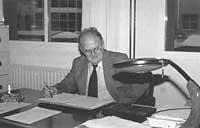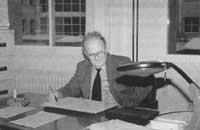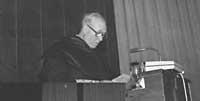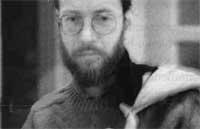Gonzalo Martín Guzmán dies
1991/10/01 Elhuyar Zientzia Iturria: Elhuyar aldizkaria
When a classmate and classmate told me that the “old dean” died on vacation, an involuntary feeling exhausted my heart. The heart attack has occurred unpredictably, as unpredictable as the summer ties. At that time they reminded me of when I was younger: At the Faculty of Chemistry in San Sebastian, I first studied and then became a professor.
Over those years I have in general a very intimate memory, although there are also difficult times. At the same time, I realize that my opinion on Gonzalo Martín Guzmán has undergone a profound change over the years. In those first years when I was a student, in my head was the image of the teacher and dean, the image of the command, with all the connotations that I could have. Then it is imposed that of the person, the person who has fought all his life, and then you understand them, perhaps because you are more adult, the attitudes and behaviors that you did not understand before and if you have ever found that behavior inappropriate, you forgive them unconditionally.

That is what happened to me with Martín Guzmán and now I have clear the importance that this great professor has had in the development of science in Euskal Herria. In fact, in its time as a student, the Faculty of Chemistry of San Sebastian has come forward thanks to its rejection and denunciation, one of the most important research centers in the Basque Country.
Gonzalo Martín Guzmán was born in Madrid in 1924. He studied chemistry in the Organic branch at the University of Madrid. After completing his studies, he joined the plastics section of the Juan de la Cierva Institute in Madrid. In 1950 he finished his thesis on silicones, the first one carried out in the State.
Thanks to a scholarship he went to the University of Birmingahm to work in the prestigious laboratory led by Sir Harry Melville. Two years ago he mentioned in the interview we did when he was appointed professor emeritus of the University of the Basque Country (Elhuyar). Science and Technology, December 1989, 18. Page. ), surprised the existing service infrastructure in the laboratory. He studied the bifurcation of macromolecules.
In 1954 he returned to Madrid to work on polymers to Juan de la Cierva. His personality and way of working were not to the liking of the heads of the institute, so he had to work alone. In 1962 he was visiting professor in the USA, India and Philadelphia. He returned to the institute in 1964, but his work situation was increasingly complicated, so he presented himself to the professor's opposition for the Engineering Schools (1968) and obtained a new position at the school in Barcelona.
There he had to face the first great challenge of his life. “I had a fixed idea in mind. Engineers are not normally researchers, they are professionals, and my goal was to demonstrate that engineers can also carry out important basic research. During the years I did in the engineering schools of Terrassa and Barcelona I put many engineers on the path of research. It was then that the real engineering doctors, not the doctors obtained until then by prestigious professionals, began. It has not been an easy task to change the minds of engineers.”
In 1975 he left Barcelona to move to San Sebastian, perhaps the most difficult work he has had in his life, opening a faculty of new characteristics in a city without a university tradition, dependent on a remote university (Valladolid). "There were no similar powers in the state. We had to start with zero. When I came to San Sebastian, two of the main drivers of the new faculty died. Everything turned out very hard, but finally we got it and seeing the fruit of 14 years later I am very happy.”
He was rector of the University of the Basque Country in the early turbulent years of the 1980s. When the retirement age came as a simple teacher, so that he could continue working on his favorite job, he was appointed professor emeritus. In recent years he has been in it, transmitting the wisdom within him to the young people sitting behind the tables.
Serve these lines to thank what Gonzalo Martín Guzmán has done for Euskal Herria.
Inaki Irazabalbeitia

Gai honi buruzko eduki gehiago
Elhuyarrek garatutako teknologia






